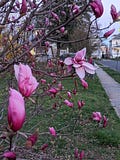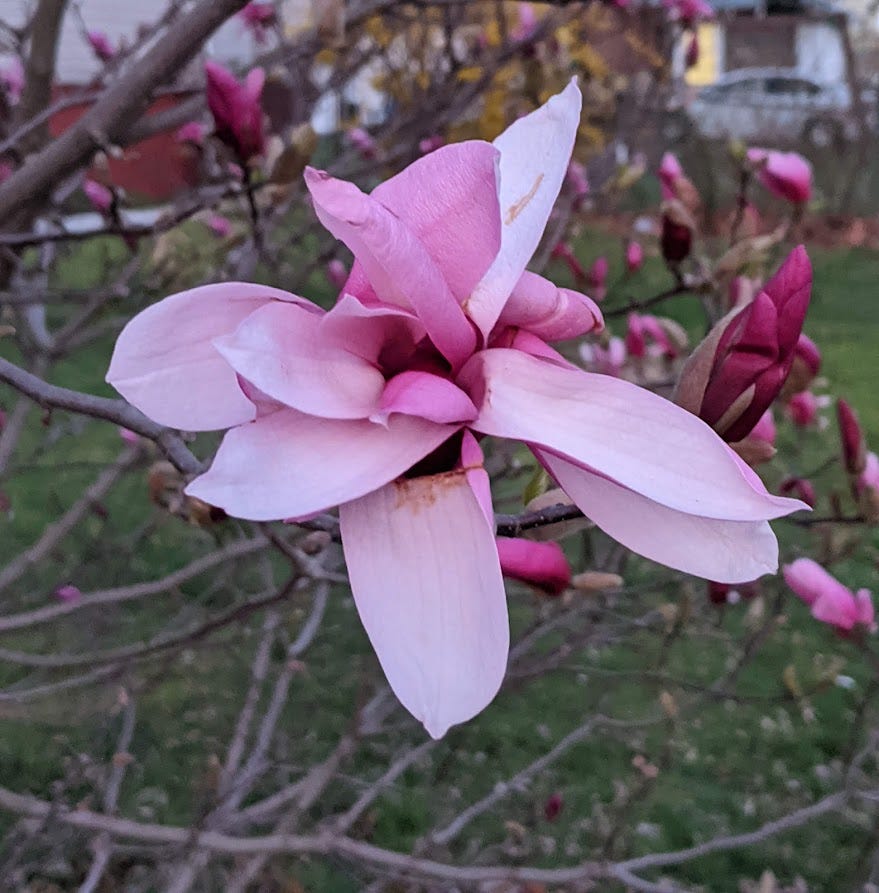April 1: the magnolias are having a hard year
starting a regular writing practice to celebrate National Poetry Month
We’re going to start this year in a slightly odd place. Rather than focusing on images or sound or memory, my usual go-tos, we’ll begin with some linguistic play. Today’s exercise is a kind of poetry mad libs, with the amount of developing a certain amount of flexibility. You can think of today’s writing as a gentle stretch. There’s no way to do it wrong.
(If you missed it, the full details about this year’s not-poem-a-day are in this post. The short version is this: each day, first thing in the morning, I’ll send a newsletter with a suggestion for how you might do a little snippet of daily writing. Then, every couple of days, the newsletter will include suggestions for how you can shape those snippets into a poem.)
On the way home from walking my kids to school earlier this week, I was thinking about how sad I was about the magnolias this year. There’s one particularly gorgeous tree that we always pass, and noticing it bud then bloom has been one of the real pleasures of the last two years. But this year, just as it was about to really burst into blossom, we had a cold snap, and every petal turned a kind of orange-y brown. The magnolias are having a hard year, I thought. And then I thought, that’s the first sentence that’s appeared to me like that—whole cloth, something that feels like an opening—in a long time. So let’s play with that.
today’s exercise
Write variations on that sentence, following the syntax but swapping in your own words. So The magnolias are having a hard year might first become The frogs are swimming a dark road and then The geese are flapping a huge roar. Write a whole bunch of sentences this way. If you want more specific parameters, two options: aim to fill at least a page and a half in a notebook, or set a timer and write for 7 minutes without stopping or worrying.
(If you hate my sentence, you could try this one, which I saw on twitter and cannot for the life of me remember who wrote: I’ve always hated paintings of fruit. Or another sentence of your choice. You want something that’s relatively brief, with relatively simple sentence structure, an active verb, and space for at least one good noun.)
You’re not trying to make sense. You’re not trying to write anything good. Keep writing until you surprise yourself. If you end up with a sentence you want to follow, do that.
a few quick notes
A reminder as we get started this month: each day’s newsletter will contain an exercise—a way to play with syntax or sound or images or some other aspect of language—rather than a prompt for a complete poem. Then, every couple of days, we’ll pause and take a look at those snippets and see how a poem might emerge from them. So if what you do today feels weird and incomplete, that’s partially by design! I’m hoping this way of approaching daily (or at least regular—it’s fine to miss days here and there!) writing will be encouraging and also a little more humane and more in keeping with the slower, more deliberate way I’m trying to work now. (If you’d like more prompts, we did a poem-a-day last year; you can find the first one here: poem #1: real things.)
And an invitation: if it helps you to share, you’re welcome to post a sentence below, or email me, or put your sentence on twitter or instagram. I’d love to know what you’re up to, and sometimes that little bit of accountability can help you keep going.
I recently interviewed the poet Lisa Dordal, whose new book Water Lessons, is just out, for a piece I’m writing for Poets & Writers, and she said something that really stuck with me: “Don’t forget joy. That’s what this is all about.” Let’s start this month in that spirit.
I’d love to hear from you. You can always reply to this email, comment below, or find me on twitter (@nancy_reddy) and instagram (@nancy.o.reddy).






The birds of paradise are squawking
as their beak blossoms turn purple
shouting for attention